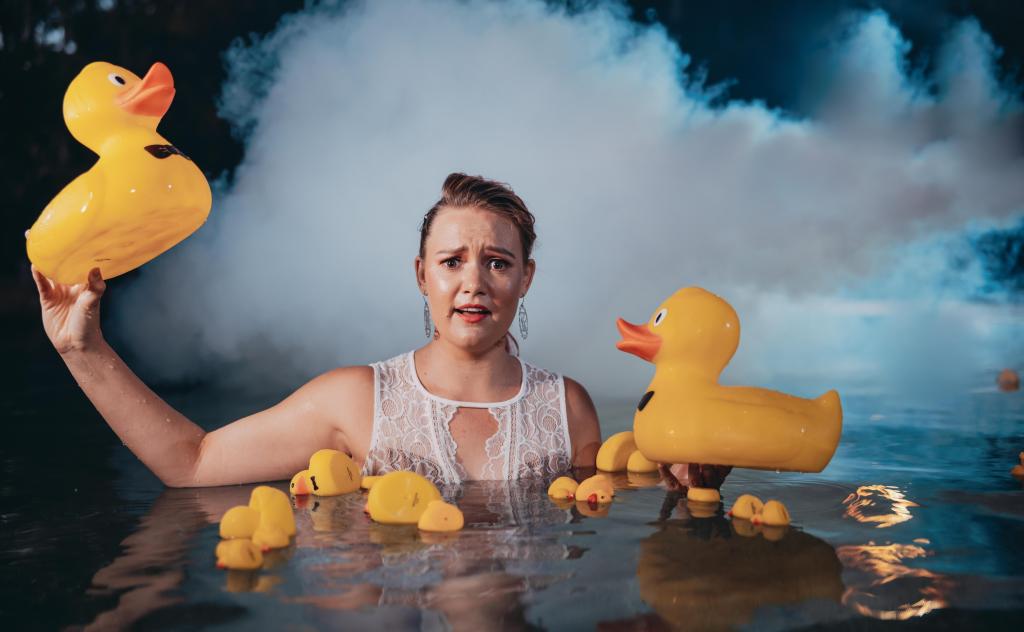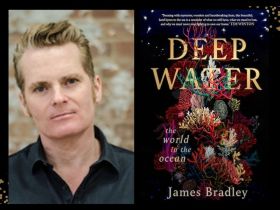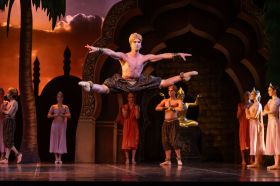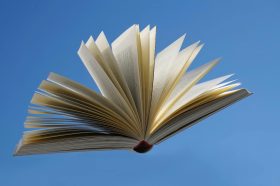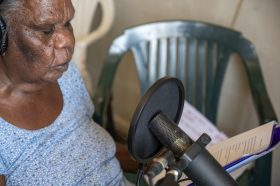Behind our masks, we’re still singing. In isolation and lockdown, artists still dream. COVID-19 may have thrown thousands of people out of work but the pandemic can’t stop creativity – even if it has slowed us down a little.
We recently asked a range of artists and arts industry leaders from around the country to answer the question: Why will we need great art more than ever after COVID-19 restrictions have lifted nationally?
We received more answers than could be contained in a single article, so here is part two, once again featuring responses from creatives in every state and territory.
Amy Hetherington, comedian
‘We need great art and “not so great” art all the time. Creating and sharing stories is essential to how we understand the world and our place in it. And being entertained and engaged by that art fills our lives with colour, creativity, hope, connectivity and fun. As a performer in a regional city (Darwin) I see the immense benefits of art from our professional creatives to our emerging acts and our community engagement programs. Art brings us together and gives us something to celebrate and talk about. That’s going to be so important as we co-exist with COVID in our new normal.’
Caitlin Comerford, Artistic Director, Stompin
‘Why will we need great art more than ever after COVID-19 restrictions have lifted nationally?
‘Because we will need help making sense of it all
‘Because we will question who we were, who we are and how we can become the people we want to be
‘Because we will need reason to feel elation
‘Because we will seek uncertainty
‘Because we will need reason to come together
‘From where I sit, in the small southern island of Australia, lutruwita, I observe many young people and artists disconnecting from their safeguards. All the while we are moving and growing in isolation, learning new ways to be ok, apart. These findings may be new safeguards and they may also be barriers to our future communal, social selves.
‘Great art – the creation, the sharing, the witnessing – will be vital in uniting us in our humanity, with a sense of empathy and shared experience.’
.jpg)
Stompin’s Nowhere, choreographed with guest artists Yolande Brown and Adam Thompson. Photo credit: Lusy Productions
Caroline Stacey, Artistic Director / CEO The Street Theatre
‘Lockdown life has left us living with uncertainty with some unsure of even what day it is. Empty theatres, devoid of people, express our loss and state of crisis. Great art has seen us through the last five months, gifting a comprehensive understanding of our global to hyperlocal cultural context.
‘But more great art is needed to bring us together again, to grow us collectively into community, to lift us out of this time. To stimulate, excite, provoke, connect, and bring confidence and hope to all. We can be certain our theatres will not be the same when restrictions lift and there is no returning to the past. The pandemic disruption has brought an openness – to work, artists, audiences, and new sustainable and fair ways of working, connecting, and being in the world. Great art filling our theatres/creative spaces with imagination is essential in taking us to this future – a future that ensures there are spaces for everyone.’
Christos Tsiolkas, writer
‘We’ll always need great art, whatever our circumstances, but I think we all now know that emerging from this pandemic will require patience, and that the new world emerging will bring many anxieties. We’ll need art that challenges us, and we will also need books and films and theatre that are balms. We will need to laugh, and we will need to learn how to argue in good faith. I suspect that the great work will not be definitive or certain, but it will be tentative and quiet. So many emperors and empresses have been revealed as naked during this pandemic. The loudest voices are ringing hollow. I just read Fred Ulhman’s 1971 novel, Reunion, about the friendship between a German Jewish boy and a German Gentile boy on the eve of WWII. It is deeply humane and deeply profound. Its quiet grace left me sobbing.’
Clare Watson, Artistic Director, Black Swan State Theatre Company
‘We need great art now and always because it gives us hope, perspective and connection. Art is essential and we all make it. We make it to make sense of the world. We make it to remember and remember anew. We make it to build empathy and promote compassion. In sport, experts push the limit of human ability in speed and strength. In science, experts commit their lives in pursuit of new discoveries. And experts in the arts who have cultivated their craft and pushed the limits of their imaginations have the capacity to lead us with hope into a new way of seeing and being – artists have always done this and the legacy of great transformation is always great art.’
Emma Webb, Director, Vitalstatistix
‘I think it’s important to grapple with the likelihood that there may not be an “after” scenario and that the world is facing a new reality for the foreseeable future, which we know will transform the ways people engage in live experiences together. Arts and culture, of course, have a tremendous role in helping people to imagine and speculate, to celebrate and stay connected, and to hone both an outward looking, empathic understanding of a pretty brutal world right now, as well an internal compass.
‘However, I see little point in proclaiming art as essential. Firstly, it’s like saying the biosphere is essential – it’s absolutely true and also fast becoming a moot point. Moreover, what we need most urgently is not art in and of itself, flung down from on high, great or otherwise. Right now, we need art that upholds democratic values, that makes radical asks, that communes with everyday life, and that reflects what we hope will be a/the future.’
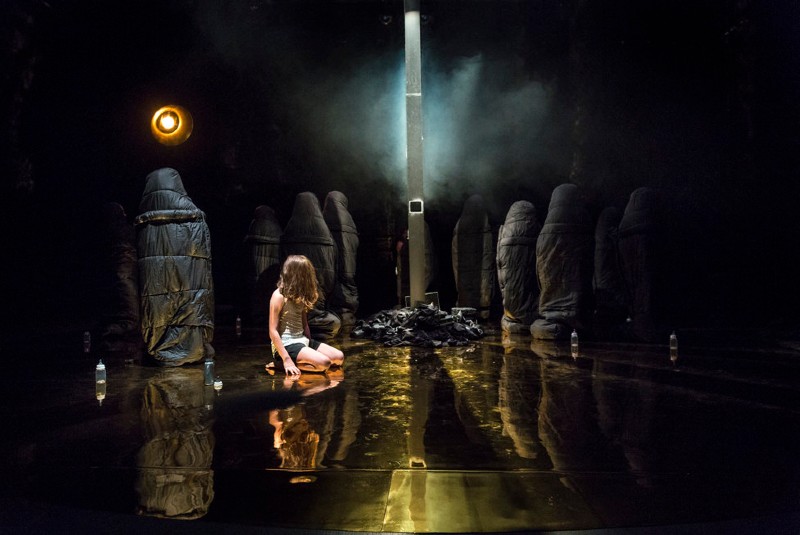
Book of Exodus Part II, produced by Fraught Outfit and designed by Eugyeene Teh. Photo credit: Pia Johnson.
Eugyeene Teh, designer
‘Out of the dark forest emerged someone bearing pink champagne.
‘I am mourning from a state of slumber. It is peaceful but draining.
‘I am trying to understand humanity in new ways; imposing a ritual in cleaning the house, making masks for friends, watching the sway of the trees.
‘How do we process the grief? What is the form of our lament? When it’s over, what will frame the new world and guide the changes?
‘Who will help us consider and shape these decisions, ethically, pertinent to us, now?
‘Last night, someone sent me a gift.’
Felix Preval, Artistic Director, Darwin Festival
‘Truthfully, we have been so focused on how to deliver a Festival for Darwin during a pandemic that we’re only now starting to look up from the mire and think about what the future could hold. What’s clear from our efforts this year though, is that communities need art, people need art. I think festivals will continue to play a vital role in bringing people together, and that excellent art and the feeling it inspires sits at the centre of that equation. Regardless of whether we get to a “post-COVID” world (lord, please!), we will need incredible art to help us reconnect on all different levels with each other and with ourselves. From a regional perspective, imagining new ways of working that can connect remote audiences with new ideas without the traditional models of touring is an exciting imperative. We’ve given it a crack this year and hopefully the results will be meaningful and memorable for our audiences – both live and virtual.’
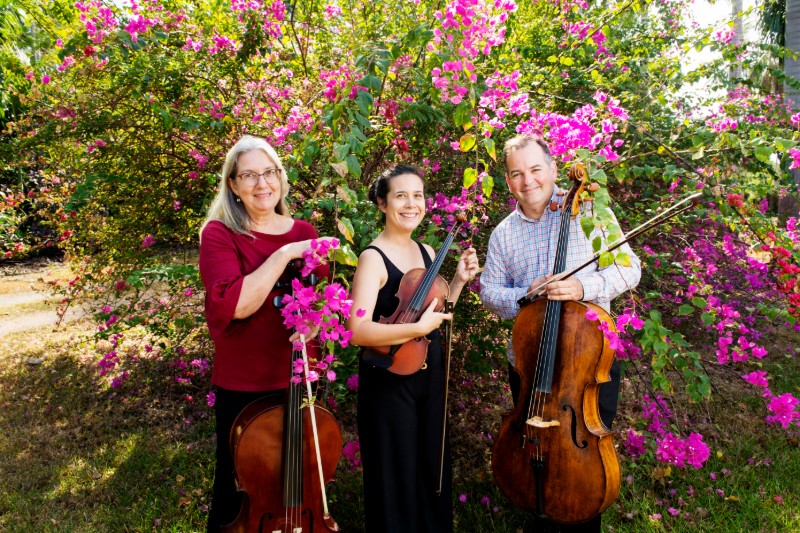
Members of the Darwin Symphony Orchestra. Photo credit: Elise Derwin
Jonathan Tooby, Artistic Director and Chief Conductor, Darwin Symphony Orchestra
‘Unique among living entities, human beings are defined by the need for storytelling, reflection and dreams. Art is all of these things and, as such, it’s essential to our spiritual survival, just as food and water are essential to physical survival.
‘COVID-19 has dramatically restricted our ability to connect, to collaborate and to celebrate what it is to be human; it has curtailed our ability to savour the incredible cultural diversity that surrounds us. Music, visual art, dance, theatre, film, to mention only a few art forms, are possible when we can gather together and share our experiences, and when we can share in the creation, development and presentation of this essential part of human existence.
‘If there is one silver lining to the pandemic, it is that COVID-19 has rather brutally reminded us of how important human contact and community are; how integral it is for us to be able to express ourselves openly within the arts, both as practitioners and participants. When Australia is free of this burden and we are once again able to connect, we will be more aware than ever before that the arts are the glue that binds us together spiritually as a nation.’
Katherine Quigley, Chief Executive Office/Artistic Director, Backbone Youth Arts
‘Throughout this year that many of us have referred to as an apocalypse, we have each at some point been left to our own devices. In this time of forced and shared inward reflection, there has been at least in part the recognition that distraction itself is not enough. Life can’t rotate around your television, stereo or bookshelf without a feeling that something is missing.
‘Human contact has been that great cherished moment that we seek out as soon as the veil is lifted. From the barista you have a cheeky flirt with, to the people you mildly ignore on public transport, or in an elevator… to friends, true friends who wrap you in their warmth for the first time in months.
‘As a culture we are still so ashamed of our tastes; what makes great art for some is just another gig at a local venue for others. Great art itself is individually determined and its only purpose for that individual is to facilitate this connection. This meeting point – between the artist, their work and the friends and strangers.
‘So yes, we will need great art after COVID, if any such time exists. However it is my hope that we now have a renewed appreciation for our audiences and what they seek. That our venues become places where connection is something that they are given upon entry. That knowing our audience is beyond a cold box office target. If indeed that is ever a factor again.
‘And, most importantly that we don’t see the words “great art” and equate that to “expensive” and “high art” anymore; that we truly and deeply respect that our communities gravitate towards and desire human connection and shared experiences, with friends and strangers, and great art is there to facilitate just that.’
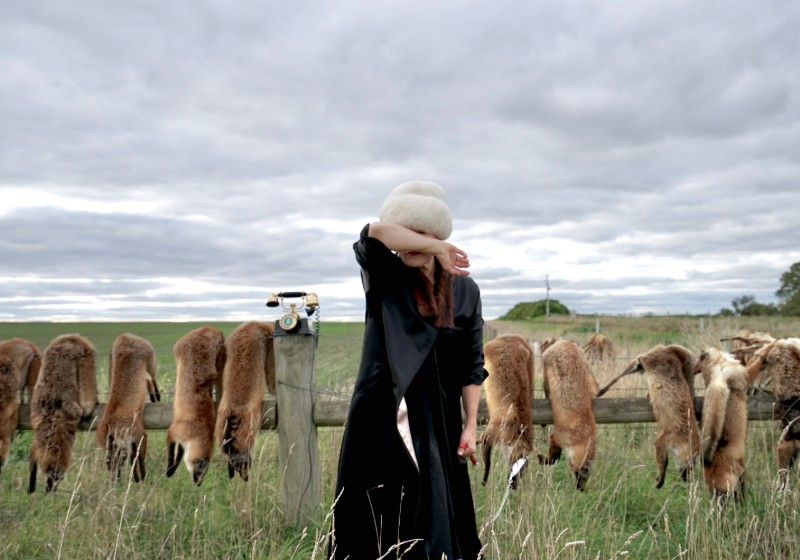
An image from the So Iso Right Now! series by Penelope Bartlau and Jason Lehane. Photo credit: Jason Lehane
Penelope Bartlau, Artistic Director, Barking Spider Visual Theatre
‘I forgot I was thirsty, then I drank.
In March 1989, I was in communist Prague, drinking beer with a group of underground musicians – classical musicians who had been blacklisted by the state, banned for life from playing. They risked their lives with their weekly jams. I sat, holding a stein, next to an old stone wall, at a table in a wonky cobbled street. The one who played cello asked, “What is it like to be free in a country where you can choose your faith?”. Nine sets of eyes were focused, paused, waiting for the answer about the free life “on the other side” in the West. I couldn’t tell them that I wasn’t religious – that Australians barbecued more than they prayed on Sundays.
‘COVID-19 has made us so thirsty, so bone-soul dry, for story and art and the communing that the shared experience of the arts brings. Like my Prague muso friends, we are buried underground and are, by necessity, suppressing our craving for great art and the shared experience. When we emerge, eyes blinking, we will recognise this sand-dust dryness of our tongues and mouths. We will reach directly for great art and the shared experience – the absolute and only remedy to this desperate, buried thirst.’
Ruby Howard (17 years), dancer, Stompin Youth Dance Company
‘The ability to create and appreciate art is one of the most vital human characteristics. The arts not only provide an avenue for individuals to process and investigate their emotions and sense of self, but also provide an outlet for whole societies to come together and share
‘In a post COVID-19 world, great art will be more important than ever. This collective tragedy that the world is experiencing, these extraordinary circumstances we now all find ourselves in, are what is shaping the collective consciousness of this generation. For humans to understand themselves and the world, and to process our current circumstances and all of the nuances and complexities that come along with them, the losses, triumphs and griefs, we must have the resources to create art that adequately reflects our experiences.’
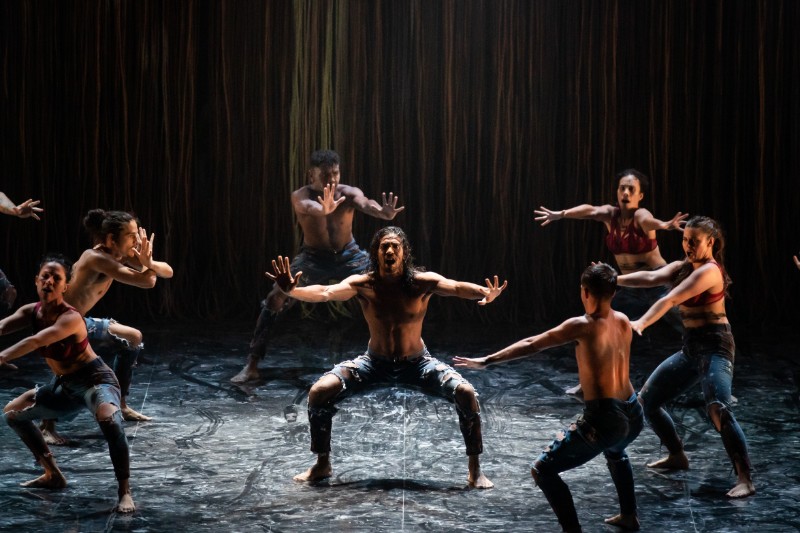
Bangarra’s Bennelong at Sydney Coliseum Theatre. Photo credit: Daniel Boud.
Stephen Page, Artistic Director, Bangarra Dance Theatre
‘Dance is our medicine, our means of drawing strength and of building resilience. There was such a lost opportunity at that moment of invasion 250 years ago: the colonisers didn’t have the curiosity or mindset to understand, learn or respect the significance of our cultural practices and the ethics that underpin our social structures and connection to Country. I fear that this pandemic is just a sign of what’s to come over the next century with the current climate emergency we find ourselves in, if those in power don’t see that this is similarly just such a moment, and that there is a real opportunity to listen to Country, and change our priorities and systems.
‘Aboriginal and Torres Strait Islander cultural knowledge offers us a vaccine, a means of building resilience. Cultural practice literally builds your immune system, and mob in community continue to cleanse their own immune systems by upholding and practicing culture, just as we have done for tens of thousands of years. We’ve been making sure that our Elders are safe and I’m so grateful that the disease hasn’t got into our rural and remote communities – we have living breathing culture which needs to be protected.
‘Live performance is the nearest thing we have to contemporary ceremony today. Whether you are a dancer who physically embodies cultural knowledge, or an audience member taking on the important role of the witness – we look to art to heal and cleanse us. My priority right now is ensuring that Bangarra’s dancers feel safe and strong both physically and mentally, for without this they can’t be vulnerable and connect to story. We have a responsibility to our stories. We have taken this time to learn old repertoire, to connect to the stories and learnings to be found within them. If we can achieve this, then when theatres do open back up and audiences and artists are able to connect again, we will be able to give you the strength to walk into this new and changed world.’
Suellen Maunder, Artistic Director/CEO, Jute Theatre Company
‘My first instinct is that we always need great art – but more than ever what I think we need is art that speaks to our times, that reflects our lives, that connects to our communities. We need great art to make sense of a world that came to a standstill, that asked social humans to be distant when our every instinct is to create community, to make sense of a world where yet another person of colour can be murdered in plain sight by those who are sworn to protect us, to make sense of humans that defied a pandemic to march in solidarity because black lives matter. There has never been a more potent time to make work that matters, that reflects, that takes up the story from where it is left on the streets and brings it to the hands and hearts of artists to grapple with and reframe and pose the questions: who were we before 2020 and how will we make a different future?
Thuy On, literary journalist, poet and critic
‘For the last few months, life for many of us under lockdown has been blanched of colour as arts events were shut down. Which is exactly why we need great art more than ever after COVID-19 restrictions have been lifted nationally. We need live performance, music, film, and art to make our sluggish pulse move faster, to make our blood jump and to remind us how vibrant and exciting life really can be.’
Read: Why we’ll need great art more than ever after COVID-19
